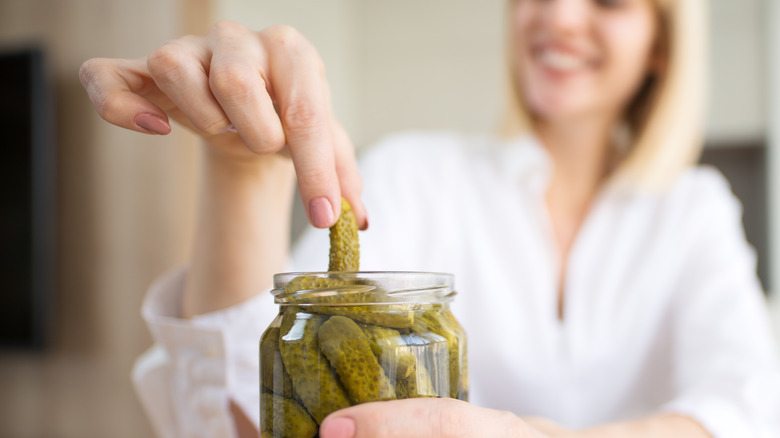
Food cravings can sometimes surprise you, especially when you’re slightly hungry and a commercial for a juicy cheeseburger catches your eye. Suddenly, you might find yourself on the DoorDash app, indulging in something delicious. While hormones can play a role in craving certain foods, your emotions might also lead you to reach for chocolate or potato chips. Occasionally, food cravings might indicate dehydration or result from habits associated with eating specific foods (per Medical News Today).
Different tastes, such as bitter, sweet, or savory, can sometimes provide clues about what your body needs. Craving savory foods might suggest a need for protein, while sweets or carbs could indicate a requirement for more calories. Although your body doesn’t require sour foods like lemons or vinegar, it might seem unusual to crave the sour taste (per The Atlantic). Food researchers remain uncertain about why people crave sour foods, but traditional Chinese medicine and Ayurveda offer potential insights: These alternative medical systems view cravings as signs of an imbalance within the body.
What traditional Chinese medicine says about sour foods

According to traditional Chinese medicine, everything in the universe is composed of five elements of energy: Wood, Fire, Earth, Metal, and Water. Craving a specific type of food suggests an imbalance in one of these energies. A craving for sour foods, for instance, could signify an imbalance in the Wood element, which is associated with liver and gallbladder qi. If you’re feeling stuck and stressed, it might indicate stagnation in your liver qi (per Yinova Center).
Sour flavors can calm the body because they initially affect the liver. The liver regulates emotions, and liver qi stagnation can lead to insomnia, headaches, or high blood pressure. Consuming something sour can stimulate liver qi and help restore emotional balance. Chinese medicine practitioners often recommend dark vinegar to help circulate blocked liver qi (per Renew Health & Acupuncture Clinic). According to Mend Acupuncture, sour foods such as sauerkraut, pickles, or kumquats can also aid your body in transitioning from the cold, sluggish winter months to the rejuvenation of spring.
What Ayurveda says about sour foods

Ayurveda, an alternative medicine system related to yoga, categorizes tastes into six types: sweet, sour, salty, pungent, bitter, and astringent. Sour foods enhance digestion and sharpen the senses. Certain foods help maintain a balance in your dosha, or personality type. The doshas combine the five natural elements—earth, air, ether, fire, and water—into three types (per Art of Living Retreat Center). Sour foods like lemon possess heating properties that are beneficial for Vatas, who are associated with air and ether (per Maharishi Ayurveda). An imbalanced Vata may experience digestive issues, poor circulation, or fatigue, so the heat in sour foods can help maintain Vata balance.
Conversely, Pittas, associated with fire and water, may become more aggressive when consuming sour foods. The Kapha dosha typically experiences sluggish digestion, so Kaphas can consume sour foods in moderation to aid digestion. In Ayurveda, excessive consumption of sour or fermented foods and beverages may lead to aggression or jealousy. Wine, beer, and liquor are considered part of this sour food category (per Art of Living Retreat Center).




